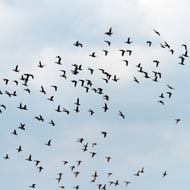Bird-aircraft collisions on the rise

Bird-aircraft collisions occur most often in the first 100 metres from the ground.
Collisions between flying animals and aircraft, power lines and wind farms are rising, according to the results of a new study. Researchers are calling for better airspace management to protect wildlife.
As airspace is increasingly used for transportation, energy generation and surveillance, conflict with animals is on the rise.
Such conflict most often occurs within the first 100 metres from the ground, according to researchers from the University of Swansea. Human activity is most concentrated here and it is where most flying animals operate.
It is also the most likely place for bird-aircraft collisions, which have resulted in the deaths of over 200 people and damage to thousands of aircraft. It costs the US alone $900 million every year.
Crowded airspace also disrupts airflow, affecting bird distribution and habitat. Disturbances to aerial micro-organisms such as bacteria and algae also affects cloud chemistry and climate.
Drones are also thought to cause stress and other physiological reactions in some bird species when they fly close to nests. However, researchers say this is a new field of study and only one research project has studied the effects of drones on birds.
Further study of bird movements is needed, as well as better management of airspace, according to the Swansea researchers, who worked with Sergio Lambertucci from the University of Comahue, Argentina.
The team said there is a strong case for creating airspace reserves in areas where human-wildlife conflict is high.
Dr Emily Shepard, from the University of Swansea, said: “One of the main challenges is to increase the awareness of the many ways we are altering the airspace. Appreciation of this, and the steps we can take to mitigate our impacts, should be embedded in planning decisions from local to regional scales, just as it is for other habitat types”.



 The Animal and Plant Health Agency (APHA) has updated its online reporting service for dead wild birds.
The Animal and Plant Health Agency (APHA) has updated its online reporting service for dead wild birds.